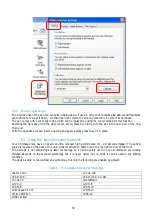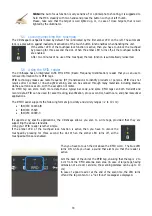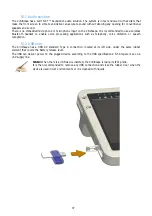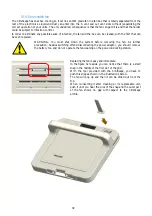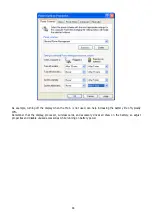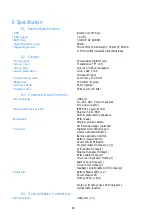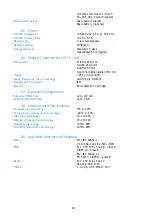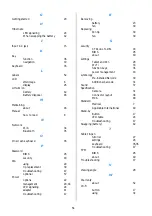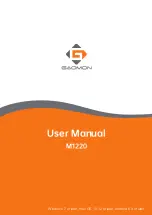
43
CAUTION:
• Danger of explosion if battery is incorrectly replaced. Replace only with the same or
equivalent type recommended the manufacturer.
As Li-ion batteries include special circuitry to protect the battery from damage due to
overcharging or undercharging. As Lithium-ion batteries also require sophisticated chargers
that can carefully monitor the charge process; put them in a charger not designed for
Lithium-ion batteries create a potentially dangerous situation.
• To charge the battery follow the instruction in this User’s Manual.
Do not disassemble or modify the battery pack. If disassembled, the battery pack could leak,
overheat, emit smoke, burst and/or ignite. Do not connect the positive (+) and negative (-)
terminals with a metal object such as wire. Short-circuiting may occur leading the battery
pack to leak, overheat, emit smoke, burst and/or ignite.
Do not pierce the battery pack with a sharp object, strike it with a hammer, step on it, or
throw it. These actions could damage or deform it, internal short-circuiting can occur,
possibly leading it to leak, overheat, emit smoke, burst and/or ignite
If the battery pack leaks, gives off a bad odour, generates heat, becomes discoloured or
deformed, or in any way appears abnormal during use, recharging or storage, immediately
remove it from the MCA or charger and stop using it. If this is discovered when you first use
the battery, return it to your Philips reseller
Do not transport the lithium ion batteries used in your MCA in checked baggage. You may
take up to two spare batteries in carryon luggage in addition to the one in your MCA.
Transporting batteries in checked baggage or transporting more than two spare batteries in
carry-on baggage violates transportation law. Remember to remove battery packs from the
battery charger before transporting it in carry-on or checked baggage
5.17.2
Storing main batteries
In case of long inactivity of the battery packs not inserted in the CliniScape, it is preferable to store them neither
fully charged nor totally empty. As the battery will lose gradually its charge, it is recommended to recharge if the
charge drops below 20% or after a few months and possibly re-use it for a few recharge cycles.
5.17.3
Battery and energy management.
As already mentioned in paragraph 3.1.1, the battery charge can be wisely used and extended by means of a few
precautions. With a standard use, the typical battery life is around three hours. But it can be shorter in case of
CPU intensive applications, as well as it can be extended to more than four hours by setting up properly the
energy options of the MCA.
Under Control panel / Power Options / Power schemes, you can chose among Power management that
matches the typical usage of the system while maximizing the battery life and minimizing the waste of energy.
Summary of Contents for CliniScape CMCA10
Page 1: ...CliniScape MCA 104 series www fimi philips com Cliniscape Mobile Clinical Assistant ...
Page 12: ...12 2 4 Overview 2 4 1 MCA Dimensions in mm 31 5 205 265 29 5 48 5 250 ...
Page 16: ...16 Ventilation grid Battery slot USB door under cover Battery release lever under cover ...
Page 55: ...55 13 Your notes ...


